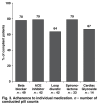Medication adherence, self-care behaviour and knowledge on heart failure in urban South Africa: the Heart of Soweto study
- PMID: 20532432
- PMCID: PMC3721814
Medication adherence, self-care behaviour and knowledge on heart failure in urban South Africa: the Heart of Soweto study
Abstract
Background: There is a paucity of data on treatment adherence in patients with chronic heart failure (CHF) in Africa.
Methods: We examined the pattern of treatment adherence, self-care behaviour and treatment knowledge in 200 consecutive patients with CHF attending the Chris Hani Baragwanath Hospital, Soweto, South Africa via a combination of questionnaire (100%, n = 200) and pill count (41%, n = 82).
Results: Mean age was 56 +/- 14 years, 157 were black African (79%) and 109 (55%) were male. CHF-specific treatment included loop diuretics (93%), beta-blockers (84%), ACE inhibitors (74%), spironolactone (64%) and cardiac glycosides (24%); mean number of medications was 6 +/- 2. Overall, 71% (58 of 82) adhered to their prescribed CHF regimen and individual medication adherence ranged from 64 to 79%. Behavioural adherence varied from 2.5 to 98%. Patient treatment knowledge was poor; 56% could not name medication effects or side effects. However, an average knowledge score of 69% was achieved on 10 questions concerning CHF management.
Conclusion: As in other regions of the world, non-adherence to complex CHF treatment is a substantial problem in Soweto. Our data confirm the need for a dedicated CHF management programme to optimise CHF-related outcomes in a low-resource environment.
Figures




Similar articles
-
Association of medication adherence, knowledge, and skills with emergency department visits by adults 50 years or older with congestive heart failure.Am J Health Syst Pharm. 2004 Oct 1;61(19):2043-9. doi: 10.1093/ajhp/61.19.2043. Am J Health Syst Pharm. 2004. PMID: 15509127
-
Adherence to guidelines in patients with chronic heart failure in primary health care.Scand J Prim Health Care. 2017 Dec;35(4):336-343. doi: 10.1080/02813432.2017.1397253. Epub 2017 Nov 6. Scand J Prim Health Care. 2017. PMID: 29105550 Free PMC article.
-
[Adherence to guidelines in CHF therapy in Germany].Dtsch Med Wochenschr. 2005 Sep 30;130(39):2191-7. doi: 10.1055/s-2005-916363. Dtsch Med Wochenschr. 2005. PMID: 16189755 German.
-
Medication adherence and heart failure.Curr Cardiol Rep. 2014 Mar;16(3):458. doi: 10.1007/s11886-013-0458-z. Curr Cardiol Rep. 2014. PMID: 24464304 Review.
-
Use of software applications to improve medication adherence and achieve more integrated disease management in heart failure.Trends Cardiovasc Med. 2018 Oct;28(7):483-488. doi: 10.1016/j.tcm.2018.04.001. Epub 2018 Apr 17. Trends Cardiovasc Med. 2018. PMID: 29699854 Review.
Cited by
-
Levels of adherence to treatment, illness perception and acceptance of illness in patients with coronary artery disease - descriptive and correlational study.BMC Cardiovasc Disord. 2024 Mar 20;24(1):171. doi: 10.1186/s12872-024-03827-w. BMC Cardiovasc Disord. 2024. PMID: 38509506 Free PMC article.
-
Determinants of adherence to heart failure medication: a systematic literature review.Heart Fail Rev. 2013 Jul;18(4):409-27. doi: 10.1007/s10741-012-9321-3. Heart Fail Rev. 2013. PMID: 22723048 Free PMC article.
-
The impact of HIV on non-adherence for tamoxifen among women with breast cancer in South Africa.Breast Cancer Res Treat. 2023 Feb;197(3):647-659. doi: 10.1007/s10549-022-06835-6. Epub 2022 Dec 20. Breast Cancer Res Treat. 2023. PMID: 36538247 Free PMC article.
-
The Effectiveness of Self-Management Strategies in Patients With Heart Failure: A Narrative Review.Cureus. 2023 Jul 14;15(7):e41863. doi: 10.7759/cureus.41863. eCollection 2023 Jul. Cureus. 2023. PMID: 37581125 Free PMC article. Review.
-
Increasing Prescription Length Could Cut Cardiovascular Disease Burden And Produce Savings In South Africa.Health Aff (Millwood). 2015 Sep;34(9):1578-85. doi: 10.1377/hlthaff.2015.0351. Health Aff (Millwood). 2015. PMID: 26355061 Free PMC article.
References
-
- Sliwa K, Damasceno A, Mayosi B. Epidemiology and etiology of cardiomyopathy in Africa. Circulation. 2005;112:3577–3583. - PubMed
-
- Stewart S, Wilkinson D, Becker A. et al. Mapping the emergence of heart disease in a black urban population in Africa: The Heart of Soweto Study. Int J Cardiol. 2006;101:101–108. - PubMed
-
- Damesceno A, Cotter G, Sliwa K, Mayosi BM. Heart failure in sub-Saharan Africa: Time for Action. J Am Coll Cardiol. 2007;50:1688–1693. - PubMed
-
- Inglis SC, Stewart S, Papachan A. et al. Anaemia and renal function in heart failure due to idiopathic dilated cardiomyopathy. Eur J Heart Fail. 2007;9:384–390. - PubMed
Publication types
MeSH terms
Substances
LinkOut - more resources
Full Text Sources
Medical
Research Materials
Miscellaneous

